- Home
- Blake Crouch
Dark Matter
Dark Matter Read online
This is a work of fiction. Names, characters, places, and incidents either are the product of the author’s imagination or are used fictitiously. Any resemblance to actual persons, living or dead, events, or locales is entirely coincidental.
Copyright © 2016 by Blake Crouch
All rights reserved.
Published in the United States by Crown, an imprint of the Crown Publishing Group, a division of Penguin Random House LLC, New York.
crownpublishing.com
CROWN is a registered trademark and the Crown colophon is a trademark of Penguin Random House LLC.
Grateful acknowledgment is made for the excerpt from “Burnt Norton” from FOUR QUARTETS by T. S. Eliot. Copyright 1936 by Houghton Mifflin Harcourt Publishing Company; copyright © renewed 1964 by T. S. Eliot. Reprinted by permission of Houghton Mifflin Harcourt Publishing Company. All right reserved.
Library of Congress Cataloging-in-Publication Data
Names: Crouch, Blake, author.
Title: Dark matter : a novel / by Blake Crouch.
Description: First edition. | New York : Crown Publishers, [2016]
Identifiers: LCCN 2015040107 | ISBN 9781101904220 (hardcover) |
ISBN 9781101904237 (ebook)
Subjects: | GSAFD: Science fiction. | Suspense fiction.
Classification: LCC PS3603.R68 D37 2016 | DDC 813/.6—dc23 LC record available at http://lccn.loc.gov/2015040107
Hardcover ISBN 9781101904220
ebook ISBN 9781101904237
International Edition ISBN 9780451496416
Title page and chapter opener images: agsandrew/Shutterstock
Cover design by Christopher Brand
v4.1
ep
Contents
Cover
Title Page
Copyright
Dedication
Epigraph
Chapter One
Chapter Two
Chapter Three
Chapter Four
Chapter Five
Chapter Six
Chapter Seven
Chapter Eight
Chapter Nine
Chapter Ten
Chapter Eleven
Chapter Twelve
Chapter Thirteen
Chapter Fourteen
Chapter Fifteen
Acknowledgments
For anyone who has wondered what their life might look like at the end of the road not taken.
What might have been and what has been
Point to one end, which is always present.
Footfalls echo in the memory
Down the passage which we did not take
Towards the door we never opened.
—T. S. Eliot, “Burnt Norton”
I love Thursday nights.
They have a feel to them that’s outside of time.
It’s our tradition, just the three of us—family night.
My son, Charlie, is sitting at the table, drawing on a sketch pad. He’s almost fifteen. The kid grew two inches over the summer, and he’s as tall as I am now.
I turn away from the onion I’m julienning, ask, “Can I see?”
He holds up the pad, shows me a mountain range that looks like something on another planet.
I say, “Love that. Just for fun?”
“Class project. Due tomorrow.”
“Then get back to it, Mr. Last Minute.”
Standing happy and slightly drunk in my kitchen, I’m unaware that tonight is the end of all of this. The end of everything I know, everything I love.
No one tells you it’s all about to change, to be taken away. There’s no proximity alert, no indication that you’re standing on the precipice. And maybe that’s what makes tragedy so tragic. Not just what happens, but how it happens: a sucker punch that comes at you out of nowhere, when you’re least expecting it. No time to flinch or brace.
The track lights shine on the surface of my wine, and the onion is beginning to sting my eyes. Thelonious Monk spins on the old turntable in the den. There’s a richness to the analog recording I can never get enough of, especially the crackle of static between tracks. The den is filled with stacks and stacks of rare vinyl that I keep telling myself I’ll get around to organizing one of these days.
My wife, Daniela, sits on the kitchen island, swirling her almost-empty wineglass in one hand and holding her phone in the other. She feels my stare and grins without looking up from the screen.
“I know,” she says. “I’m violating the cardinal rule of family night.”
“What’s so important?” I ask.
She levels her dark, Spanish eyes on mine. “Nothing.”
I walk over to her, take the phone gently out of her hand, and set it on the countertop.
“You could start the pasta,” I say.
“I prefer to watch you cook.”
“Yeah?” Quieter: “Turns you on, huh?”
“No, it’s just more fun to drink and do nothing.”
Her breath is wine-sweet, and she has one of those smiles that seem architecturally impossible. It still slays me.
I polish off my glass. “We should open more wine, right?”
“It would be stupid not to.”
As I liberate the cork from a new bottle, she picks her phone back up and shows me the screen. “I was reading Chicago Magazine’s review of Marsha Altman’s show.”
“Were they kind?”
“Yeah, it’s basically a love letter.”
“Good for her.”
“I always thought…” She lets the sentence die, but I know where it was headed. Fifteen years ago, before we met, Daniela was a comer to Chicago’s art scene. She had a studio in Bucktown, showed her work in a half-dozen galleries, and had just lined up her first solo exhibition in New York. Then came life. Me. Charlie. A bout of crippling postpartum depression.
Derailment.
Now she teaches private art lessons to middle-grade students.
“It’s not that I’m not happy for her. I mean, she’s brilliant, she deserves it all.”
I say, “If it makes you feel any better, Ryan Holder just won the Pavia Prize.”
“What’s that?”
“A multidisciplinary award given for achievements in the life and physical sciences. Ryan won for his work in neuroscience.”
“Is it a big deal?”
“Million dollars. Accolades. Opens the floodgates to grant money.”
“Hotter TAs?”
“Obviously that’s the real prize. He invited me to a little informal celebration tonight, but I passed.”
“Why?”
“Because it’s our night.”
“You should go.”
“I’d really rather not.”
Daniela lifts her empty glass. “So what you’re saying is, we both have good reason to drink a lot of wine tonight.”
I kiss her, and then pour generously from the newly opened bottle.
“You could’ve won that prize,” Daniela says.
“You could’ve owned this city’s art scene.”
“But we did this.” She gestures at the high-ceilinged expanse of our brownstone. I bought it pre-Daniela with an inheritance. “And we did that,” she says, pointing to Charlie as he sketches with a beautiful intensity that reminds me of Daniela when she’s absorbed in a painting.
It’s a strange thing, being the parent of a teenager. One thing to raise a little boy, another entirely when a person on the brink of adulthood looks to you for wisdom. I feel like I have little to give. I know there are fathers who see the world a certain way, with clarity and confidence, who know just what to say to their sons and daughters. But I’m not one of them. The older I get, the less I understand. I love my son. He means everything to me. And yet, I can’t escape the feel
ing that I’m failing him. Sending him off to the wolves with nothing but the crumbs of my uncertain perspective.
I move to the cabinet beside the sink, open it, and start hunting for a box of fettuccine.
Daniela turns to Charlie, says, “Your father could have won the Nobel.”
I laugh. “That’s possibly an exaggeration.”
“Charlie, don’t be fooled. He’s a genius.”
“You’re sweet,” I say. “And a little drunk.”
“It’s true, and you know it. Science is less advanced because you love your family.”
I can only smile. When Daniela drinks, three things happen: her native accent begins to bleed through, she becomes belligerently kind, and she tends toward hyperbole.
“Your father said to me one night—never forget it—that pure research is life-consuming. He said…” For a moment, and to my surprise, emotion overtakes her. Her eyes mist, and she shakes her head like she always does when she’s about to cry. At the last second, she rallies, pushes through. “He said, ‘Daniela, on my deathbed I would rather have memories of you than of a cold, sterile lab.’ ”
I look at Charlie, catch him rolling his eyes as he sketches.
Probably embarrassed by our display of parental melodrama.
I stare into the cabinet and wait for the ache in my throat to go away.
When it does, I grab the pasta and close the door.
Daniela drinks her wine.
Charlie draws.
The moment passes.
“Where’s Ryan’s party?” Daniela asks.
“Village Tap.”
“That’s your bar, Jason.”
“So?”
She comes over, takes the box of pasta out of my hand.
“Go have a drink with your old college buddy. Tell him you’re proud of him. Head held high. Tell him I said congrats.”
“I will not tell him you said congrats.”
“Why?”
“He has a thing for you.”
“Stop it.”
“It’s true. From way back. From our roommate days. Remember the last Christmas party? He kept trying to trick you into standing under the mistletoe with him?”
She just laughs, says, “Dinner will be on the table by the time you get home.”
“Which means I should be back here in…”
“Forty-five minutes.”
“What would I be without you?”
She kisses me.
“Let’s not even think about it.”
I grab my keys and wallet from the ceramic dish beside the microwave and move into the dining room, my gaze alighting on the tesseract chandelier above the dinner table. Daniela gave it to me for our tenth wedding anniversary. Best gift ever.
As I reach the front door, Daniela shouts, “Return bearing ice cream!”
“Mint chocolate chip!” Charlie says.
I lift my arm, raise my thumb.
I don’t look back.
I don’t say goodbye.
And this moment slips past unnoticed.
The end of everything I know, everything I love.
—
I’ve lived in Logan Square for twenty years, and it doesn’t get any better than the first week of October. It always puts me in mind of that F. Scott Fitzgerald line: Life starts all over again when it gets crisp in the fall.
The evening is cool, and the skies are clear enough to see a handful of stars. The bars are more rambunctious than usual, jammed with disappointed Cubs fans.
I stop on the sidewalk in the glow of a gaudy sign that blinks VILLAGE TAP and stare through the open doorway of the ubiquitous corner bar you’ll find in any self-respecting Chicago neighborhood. This one happens to be my local watering hole. It’s the closest to home—a few blocks from my brownstone.
I pass through the glow of the blue neon sign in the front window and step through the doorway.
Matt, the bartender and owner, nods to me as I move down the bar, threading my way through the crowd that surrounds Ryan Holder.
I say to Ryan, “I was just telling Daniela about you.”
He smiles, looking exquisitely groomed for the lecture circuit—fit and tan in a black turtleneck, his facial hair elaborately landscaped.
“Goddamn is it good to see you. I’m moved that you came. Darling?” He touches the bare shoulder of the young woman occupying the stool beside his. “Would you mind letting my dear old friend steal your chair for a minute?”
The woman dutifully abandons her seat, and I climb onto the stool beside Ryan.
He calls the bartender over. “We want you to set us up with a pair of the most expensive pours in the house.”
“Ryan, not necessary.”
He grabs my arm. “We’re drinking the best tonight.”
Matt says, “I have Macallan Twenty-Five.”
“Doubles. My tab.”
When the bartender goes, Ryan punches me in the arm. Hard. You wouldn’t peg him as a scientist at first glance. He played lacrosse during his undergrad years, and he still carries the broad-shouldered physique and ease of movement of a natural athlete.
“How’s Charlie and the lovely Daniela?”
“They’re great.”
“You should’ve brought her down. I haven’t seen her since last Christmas.”
“She sends along her congrats.”
“You got a good woman there, but that’s not exactly news.”
“What are the chances of you settling down in the near future?”
“Slim. The single life, and its considerable perks, appears to suit me. You’re still at Lakemont College?”
“Yeah.”
“Decent school. Undergrad physics, right?”
“Exactly.”
“So you’re teaching…”
“Quantum mechanics. Intro stuff mainly. Nothing too terribly sexy.”
Matt returns with our drinks, and Ryan takes them out of his hands and sets mine before me.
“So this celebration…,” I say.
“Just an impromptu thing a few of my postgrads threw together. They love nothing more than to get me drunk and holding court.”
“Big year for you, Ryan. I still remember you almost flunking differential equations.”
“And you saved my ass. More than once.”
For a second, behind the confidence and the polish, I glimpse the goofy, fun-loving grad student with whom I shared a disgusting apartment for a year and a half.
I ask, “Was the Pavia Prize for your work in—”
“Identifying the prefrontal cortex as a consciousness generator.”
“Right. Of course. I read your paper on it.”
“What’d you think?”
“Dazzling.”
He looks genuinely pleased at the compliment.
“If I’m honest, Jason, and there’s no false modesty here, I always thought it would be you publishing the seminal papers.”
“Really?”
He studies me over the top of his black plastic glass frames.
“Of course. You’re smarter than I am. Everyone knew it.”
I drink my whisky. I try not to acknowledge how delicious it is.
He says, “Just a question, but do you see yourself more as a research scientist or a teacher these days?”
“I—”
“Because I see myself, first and foremost, as a man pursuing answers to fundamental questions. Now, if the people around me”—he gestures at his students who have begun to crowd in—“are sharp enough to absorb knowledge by sheer proximity to me…great. But the passing on of knowledge, as it were, doesn’t interest me. All that matters is the science. The research.”
I note a flicker of annoyance, or anger, in his voice, and it’s building, like he’s getting himself worked up toward something.
I try to laugh it off. “Are you upset with me, Ryan? It almost sounds like you think I let you down.”
“Look, I’ve taught at MIT, Harvard, Johns Hopkins, the best schools on the pla
net. I’ve met the smartest motherfuckers in the room, and Jason, you would’ve changed the world if you’d decided to go that path. If you’d stuck with it. Instead, you’re teaching undergrad physics to future doctors and patent lawyers.”
“We can’t all be superstars like you, Ryan.”
“Not if you give up.”
I finish my whisky.
“Well, I’m so glad I popped in for this.” I step down off the barstool.
“Don’t be that way, Jason. I was paying you a compliment.”
“I’m proud of you, man. I mean that.”
“Jason.”
“Thanks for the drink.”
Back outside, I stalk down the sidewalk. The more distance I put between myself and Ryan, the angrier I become.
And I’m not even sure at whom.
My face is hot.
Lines of sweat trail down my sides.
Without thinking, I step into the street against a crosswalk signal and instantly register the sound of tires locking up, of rubber squealing across pavement.
I turn and stare in disbelief as a yellow cab barrels toward me.
Through the approaching windshield, I see the cabbie so clearly—a mustached man, wide-eyed with naked panic, bracing for impact.
And then my hands are flat against the warm, yellow metal of the hood and the cabbie is leaning out his window, screaming at me, “You dipshit, you almost died! Pull your head out of your ass!”
Horns begin to blare behind the cab.
I retreat to the sidewalk and watch the flow of traffic resume.
The occupants of three separate cars are kind enough to slow down so they can flip me off.
—
Whole Foods smells like the hippie I dated before Daniela—a tincture of fresh produce, ground coffee, and essential oils.
The scare with the cab has flattened my buzz, and I browse the freezer cases in something of a fog, lethargic and sleepy.
It feels colder when I’m back outside, a brisk wind blowing in off the lake, portending the shitty winter that looms right around the corner.
With my canvas bag filled with ice cream, I take a different route toward home. It adds six blocks, but what I lose in brevity, I gain in solitude, and between the cab and Ryan, I need some extra time to reset.

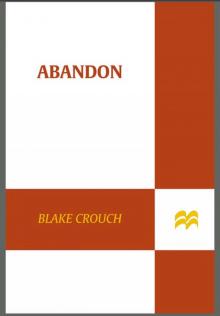 Abandon
Abandon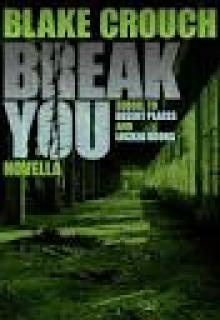 Break You
Break You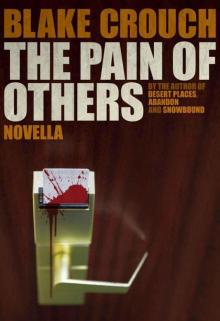 The Pain of Others
The Pain of Others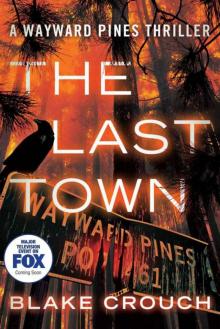 The Last Town
The Last Town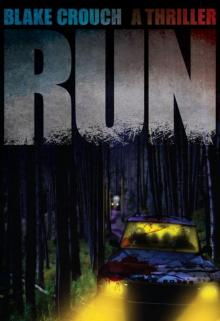 Run
Run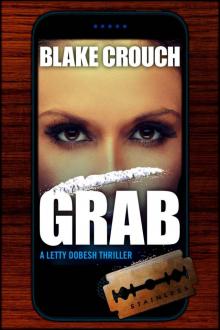 Grab
Grab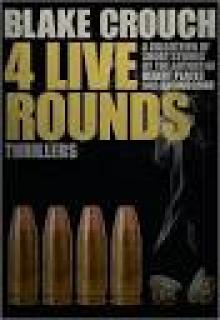 Four Live Rounds
Four Live Rounds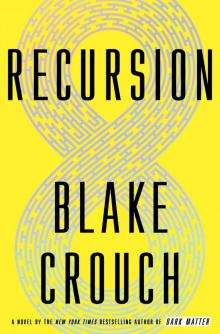 Recursion
Recursion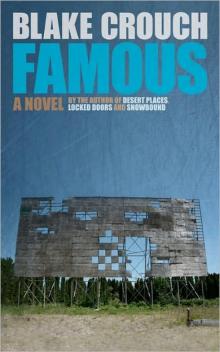 LUMINOUS BLUE: A Novel of Warped Celebrity
LUMINOUS BLUE: A Novel of Warped Celebrity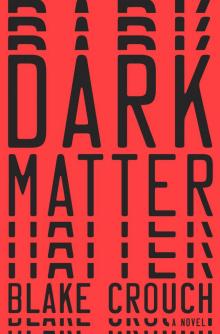 Dark Matter
Dark Matter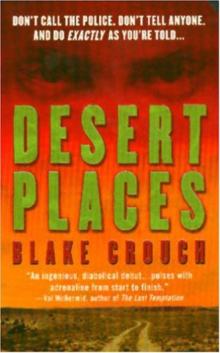 Desert Places
Desert Places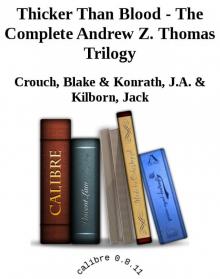 Thicker Than Blood - the Complete Andrew Z. Thomas Series
Thicker Than Blood - the Complete Andrew Z. Thomas Series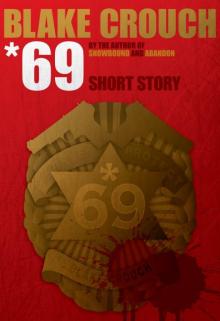 *69
*69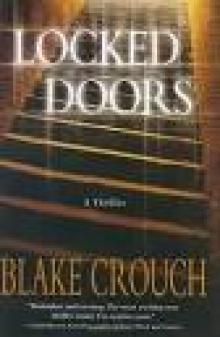 Locked Doors
Locked Doors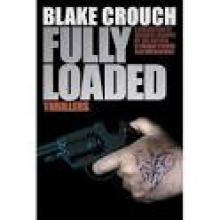 Fully Loaded Thrillers
Fully Loaded Thrillers![Summer Frost [Forward Collection] Read online](http://i1.bookreadfree.com/02/summer_frost_forward_collection_preview.jpg) Summer Frost [Forward Collection]
Summer Frost [Forward Collection]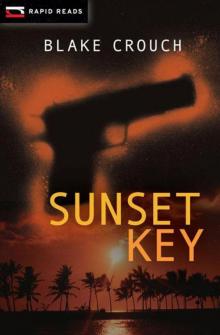 Sunset Key
Sunset Key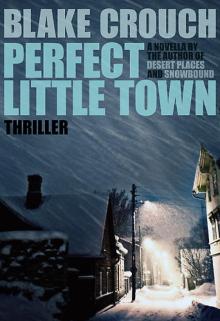 Perfect Little Town
Perfect Little Town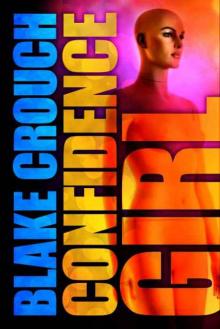 Confidence Girl
Confidence Girl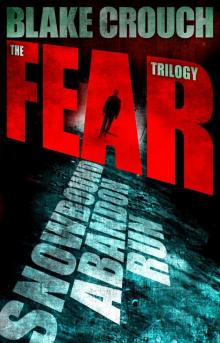 The Fear Trilogy
The Fear Trilogy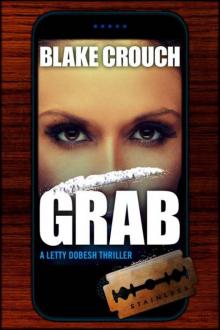 Grab ldm-3
Grab ldm-3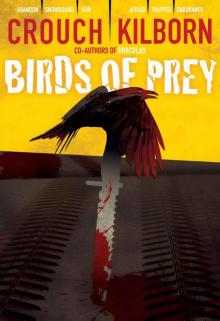 BIRDS OF PREY - A Psycho Thriller
BIRDS OF PREY - A Psycho Thriller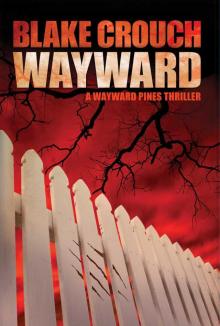 Wayward (The Wayward Pines Series, Book Two)
Wayward (The Wayward Pines Series, Book Two) Hunting Season: A Love Story
Hunting Season: A Love Story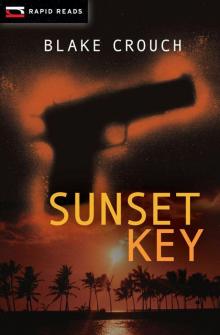 Sunset Key (Rapid Reads)
Sunset Key (Rapid Reads)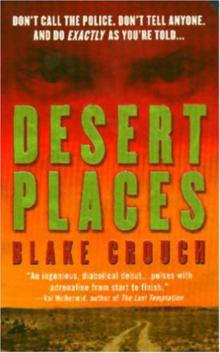 Desert Places: a Novel of Terror
Desert Places: a Novel of Terror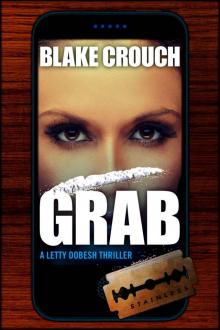 Grab (Letty Dobesh #3)
Grab (Letty Dobesh #3)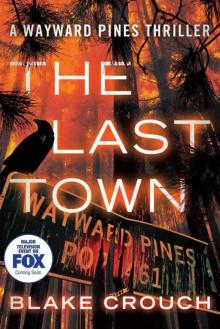 The Last Town (The Wayward Pines Trilogy 3)
The Last Town (The Wayward Pines Trilogy 3)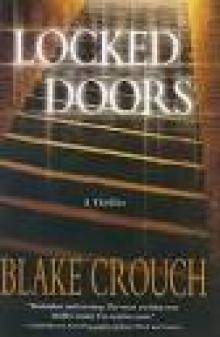 LOCKED DOORS: A Novel of Terror (Andrew Z. Thomas Thriller)
LOCKED DOORS: A Novel of Terror (Andrew Z. Thomas Thriller) BREAK YOU: A Novella of Terror (Prequel to Stirred) (Andrew Z. Thomas/Luther Kite)
BREAK YOU: A Novella of Terror (Prequel to Stirred) (Andrew Z. Thomas/Luther Kite)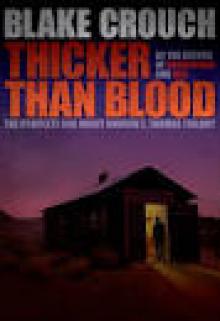 Thicker Than Blood - The Complete Andrew Z. Thomas Trilogy
Thicker Than Blood - The Complete Andrew Z. Thomas Trilogy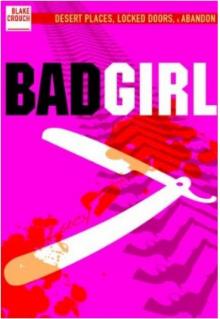 Bad Girl
Bad Girl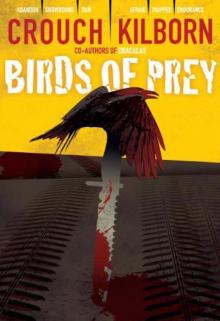 Birds of Prey
Birds of Prey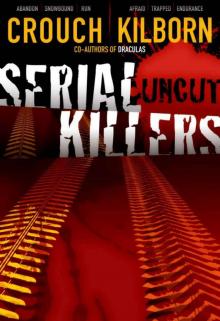 SERIAL KILLERS UNCUT - The Complete Psycho Thriller (The Complete Epic)
SERIAL KILLERS UNCUT - The Complete Psycho Thriller (The Complete Epic)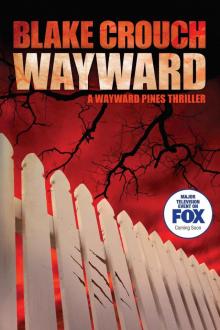 Wayward (The Wayward Pines Trilogy, Book 2)
Wayward (The Wayward Pines Trilogy, Book 2)